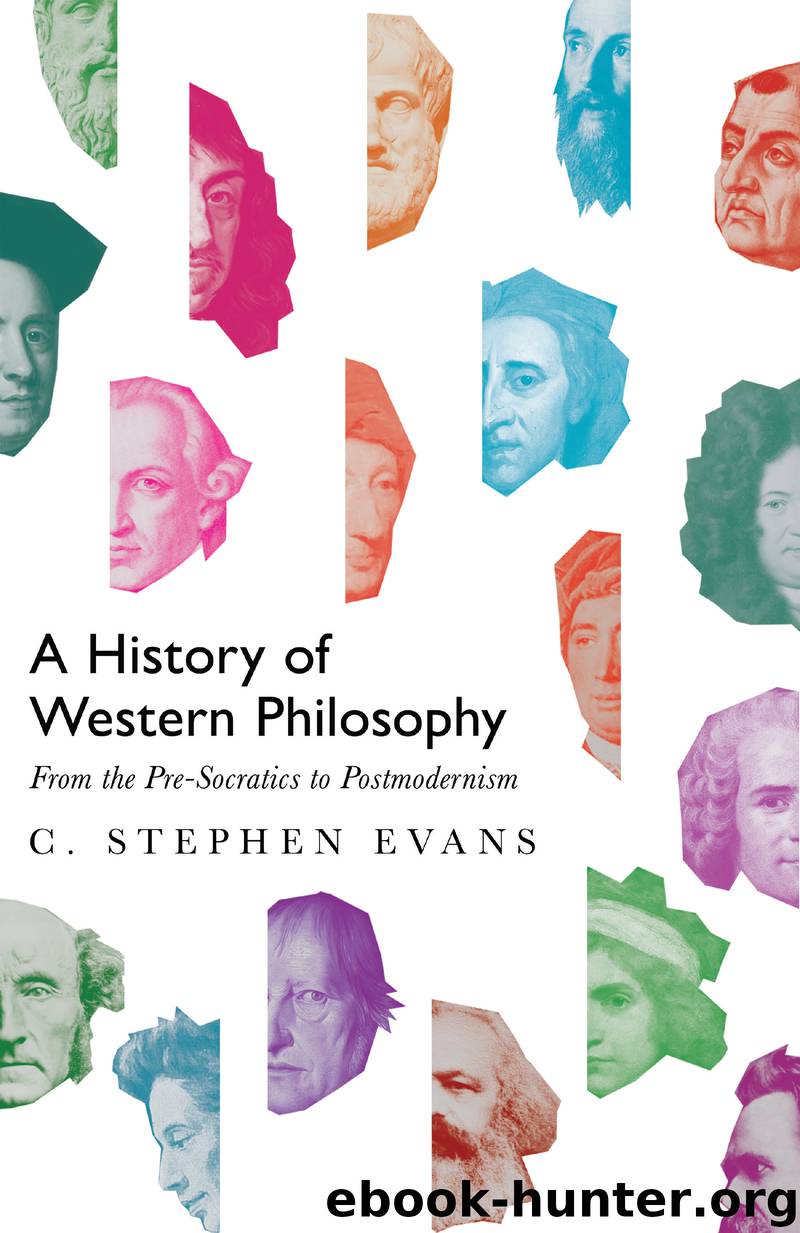A History of Western Philosophy by Evans C. Stephen;

Author:Evans, C. Stephen;
Language: eng
Format: epub
Tags: philosophy;philosopher;history;history of philosophy;knowledge;metaphysics;ethics;aesthetics;Plato;Aristotle;Augustine;Aquinas;Descartes;Locke;Hume;Kant;Hegel;Marx;Kierkegaard;Nietzsche;Socrates;God;Christian;Christianity;Christian philosophy;philosophy student;philosophy class;philosophy textbook;philosophy book;introduction to philosophy;western philosophy;western philosopher;postmodern;postmodernism;postmodern philosophy;philosophical figures
Publisher: InterVarsity Press
Published: 2018-09-04T15:31:15+00:00
15
The Scottish Enlightenment (I)
David Hume
In this chapter and the next I shall discuss David Hume and Thomas Reid, two of the greatest British philosophers. Hume and Reid were Scottish contemporaries who were dominant philosophical figures in the eighteenth century and have remained significant, although the relative status of the two thinkers has changed over time. In the late eighteenth and nineteenth centuries, particularly in America, Reid was considered the greater philosopher. Reid’s “commonsense” philosophy, sometimes just called “the Scottish philosophy” or “Scottish realism” during that time, dominated American higher education until the early twentieth century. Hume, while recognized as an important figure, was regarded as a skeptic who undermined religious faith, and his thought was less influential. However, as American higher education secularized in the twentieth century, with the development of the great land-grant state universities, Hume’s star ascended and Reid began to appear as a lesser figure. Hume continues to be immensely influential in Anglo-American philosophy today; many regard him as the greatest philosopher who has ever written in English. However, beginning in the late twentieth century there has also been a resurgence of interest in Reid. Many philosophers today find Reid’s epistemology, especially his account of perceptual knowledge, attractive.
Reid and Hume of course knew each other, and each regarded the other’s philosophy as the antithesis of his own. Reid respected Hume as a subtle thinker who had courageously drawn out the consequences of the major assumptions made by Locke and Descartes. However, Reid thought those conclusions were disastrous and thus saw Hume as giving a kind of reductio ad absurdum of those philosophical assumptions. Reid is thus usually read as a fierce critic of Hume. Hume seems to have had less respect for Reid, although we know that he read and commented on some of Reid’s works prior to publication. In a letter to a mutual friend, Hume complained that “I wish that the Parsons [Reid had been a minister before being appointed to a university chair] would confine themselves to their old occupation of worrying one another, and leave Philosophers to argue with temper, moderation, and good manners.”1 The irritation Hume shows here may indicate that Reid’s criticisms stung Hume more than he wished to reveal publicly.
Despite the large differences between Hume and Reid, I shall try to show that there are also some similarities. The two thinkers are more alike than either realized or would have been willing to admit. These similarities are particularly evident if one interprets Hume as a more “constructive” thinker, as is frequently the case today, and less as a skeptic, as was generally the case in the past. As we shall see, whether Hume is a skeptic—and if so, what kind of skeptic he is—are key questions raised by his philosophy.
Download
This site does not store any files on its server. We only index and link to content provided by other sites. Please contact the content providers to delete copyright contents if any and email us, we'll remove relevant links or contents immediately.
The Lost Art of Listening by Michael P. Nichols(7160)
Why I Am Not A Calvinist by Dr. Peter S. Ruckman(4045)
The Rosicrucians by Christopher McIntosh(3371)
Wicca: a guide for the solitary practitioner by Scott Cunningham(3040)
Signature in the Cell: DNA and the Evidence for Intelligent Design by Stephen C. Meyer(2875)
Real Sex by Lauren F. Winner(2861)
The Holy Spirit by Billy Graham(2775)
To Light a Sacred Flame by Silver RavenWolf(2674)
The End of Faith by Sam Harris(2632)
The Gnostic Gospels by Pagels Elaine(2393)
Waking Up by Sam Harris(2330)
Nine Parts of Desire by Geraldine Brooks(2279)
Jesus by Paul Johnson(2224)
Devil, The by Almond Philip C(2204)
The God delusion by Richard Dawkins(2186)
Heavens on Earth by Michael Shermer(2186)
Kundalini by Gopi Krishna(2089)
Chosen by God by R. C. Sproul(2053)
The Nature of Consciousness by Rupert Spira(1980)
